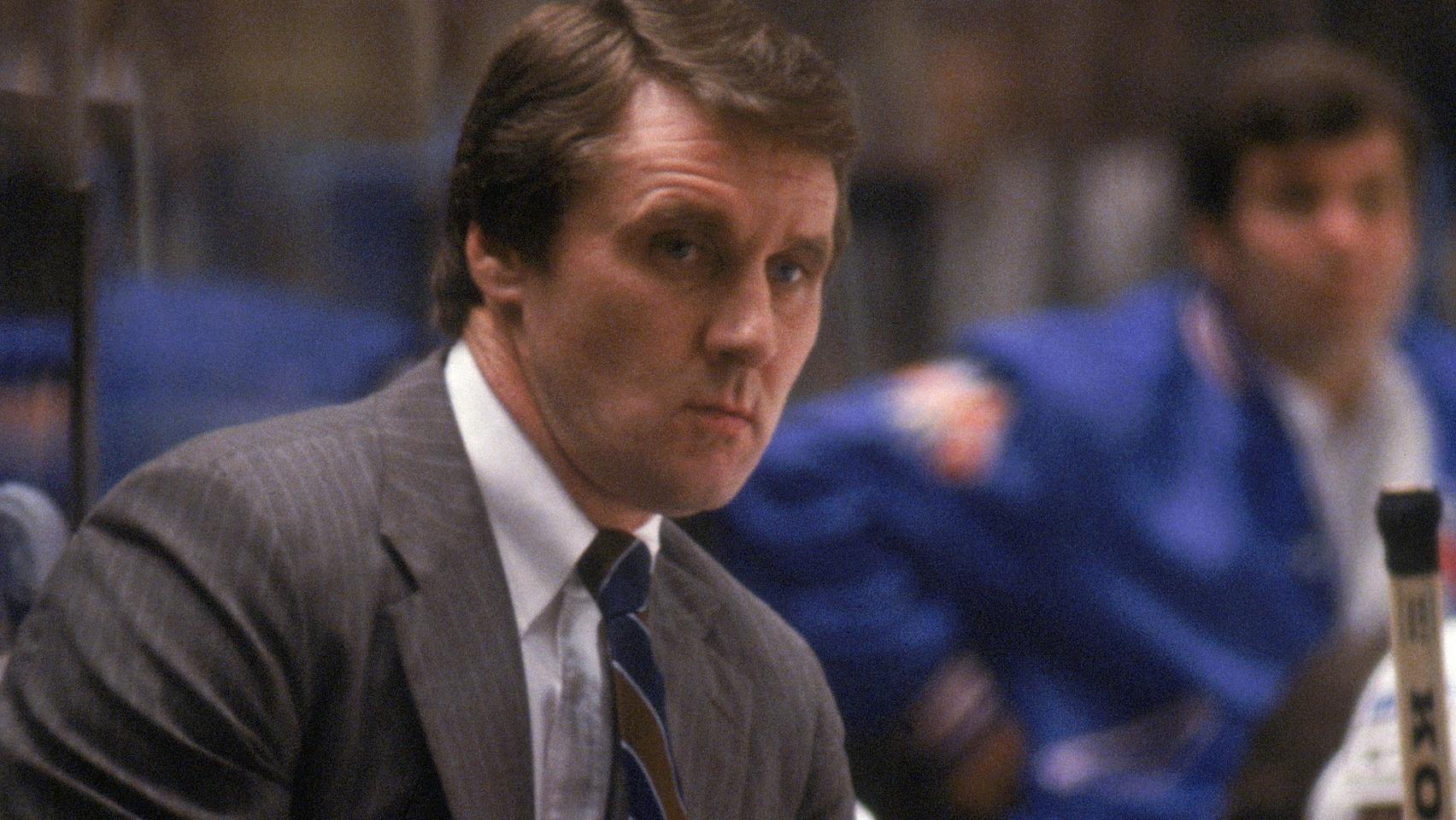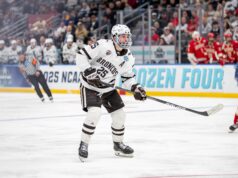By Wayne Coffey / Special to NHL.com–
The most iconic coach in the annals of American hockey grew up in a humble home at the corner of Payne and Ivy Streets in east St. Paul, Minnesota, a man of international renown who never stopped seeing himself as “a-beer-and-a-shot guy” from the neighborhood. Others could have celebrity and its trappings; Herb Brooks was more interested in his unrelenting pursuit of the perfect game of hockey, and holding tight to his moral compass.
“Herb knew how to pull greatness out of people,” former U.S. Olympic goaltender Jim Craig said. “He did it all of his life. He had the ability to look into someone’s soul and know [what was inside it].”
It has been 37 years since Brooks’ brigade of (mostly) college kids and overachievers defeated the Soviet Union 4-3 on a Friday night in Lake Placid, New York, the “Miracle on Ice” that didn’t win an Olympic gold medal but does remain the gold standard of American sporting highlights. Fourteen years ago Aug. 11, Brooks became the first member of the team to die, losing control of his Toyota minivan as he returned from a fundraiser for the U.S. Hockey Hall of Fame in Eveleth, Minnesota.
Herb Brooks would’ve turned 80 years old Saturday, the passage of decades doing nothing to diminish the impact of his life behind the bench, or the enduring image of Brooks in that little north-country rink that has since been renamed for him, exhorting his players in his camel-colored sports jacket and plaid pants, eyes on a swivel, taking in everything, telling his guys over and over, “Play your game, play your game,” as the seconds ticked down.
Ken Morrow was a stellar stay-at-home defenseman on that 1980 U.S. team who months later followed his gold medal with the first of four Stanley Cup championships he won with the New York Islanders.
“We wouldn’t have won if Herb hadn’t been the coach,” said Morrow, the Islanders director of pro scouting. “That’s not to take anything away from the players. We had a much better team than people gave us credit for. But Herb was way ahead of his time. He deserves to be right there with the legendary coaches in any sport. What he was able to do, the way he was able to manipulate everything and plan everything, I am in awe of it [even now].”
Brooks got the job after presiding over a remarkable overhaul of the University of Minnesota program, taking a last-place team and directing it to three national championships between 1974 and ’79. A tireless student of international hockey and of Soviet hockey in particular, Brooks reconfigured virtually every aspect of the U.S. Olympic preparation manual, setting up an unprecedented 61-game schedule, painstakingly constructed to allow for maximum training time, expose the players to a wide variety of opponents and forge the most fit team in the world.
“We did plyometrics before anybody knew what plyometrics were,” Morrow said.
They also borrowed from the Soviets and did overspeed training, performing drills at near breakneck pace, preparing players to compete on the bigger Olympic sheets, to play and think more quickly. Morrow doesn’t think it was any sort of fluke that the United States outscored opponents 16-3 in the third period of its Olympic games.
“In my whole career I was never in better shape than I was that year,” Morrow said.
Brooks’ boldest move was to eschew the time-honored North American style of play, and go with what he called a hybrid approach, braiding grit with the free-flowing, fast-skating European style. Enough with dump-and-chase, Brooks said.
“I didn’t want to the team throwing away the puck with no reason,” Brooks said. “That’s stupid. It’s the same as punting on first down.”
Brooks’ calculations were no less fine-tuned in his psychological approach. With deep, regional fissures on the team, Brooks united the players — mostly Midwesterners and including four Boston guys — by making himself the common enemy, the proverbial bad cop who pushed them all mercilessly. Craig Patrick, his assistant, was left to repair the psychic wounds.
Brooks scheduled a game against the Soviets at Madison Square Garden for Feb. 9, three days before the Olympics. He told a confidant, “We’re going to get beat and the players are going to need that.” The Soviets won, 10-3, and never quite shed their overconfidence.
“A lot of what he did could’ve backfired, but none of it did,” Morrow said.
Said Craig: “Every day I think of Herb and how revolutionary he was. He had so much courage and vision.”
To Craig, Brooks’ daring speaks to the wisdom of an old truth: “Failure isn’t fatal but being afraid to fail is.”
That Friday night in Lake Placid, Feb. 22, began with Brooks’ now-famous pregame message: “You were born to be a player. You were meant to be here. This moment is yours.”
The Soviets had a 2-1 lead in the waning moments of the first period when Mark Johnson, the top U.S. player, kept skating to the horn and caught Vladislav Tretiak, the legendary Soviet goaltender, out of his net and scored at 19:59. Soviet coach Viktor Tikhonov was so infuriated at Tretiak, arguably the greatest goaltender in history, that he replaced him with Vladimir Myshkin.
The Soviets regained the lead in the second period, but Craig, who stopped 36 of 39 shots, was immense all game long in shutting down the world’s most vaunted attack. Johnson scored again at 8:39 of the third, and then 81 seconds later, U.S. forward John Harrington pried the puck loose to linemate Mark Pavelich, his fellow University of Minnesota Duluth Bulldog.
Pavelich shoveled it to the center, even as he fell down, the puck finding the stick of forward Mike Eruzione. Eruzione scored on a wrist shot past Myshkin, and the Americans had a 4-3 lead, and the longest 10 minutes of their hockey lives ahead of them.
Time ticked away, so slowly. Nine minutes. Eight minutes. Finally, it got down inside five, then three, then one. The Soviets were desperate but never pulled Myshkin. They hadn’t even prepared for the possibility it would be necessary.
In the closing seconds, on ABC’s tape-delayed telecast, Al Michaels said, “Do you believe in miracles? Yes!” The U.S. players poured onto the ice, a happy heap on top of Craig, as the dazed Soviets looked on, most of them as stonelike as statues in Red Square.
Brooks went on to win 219 games in the NHL and even came back to coach the United States — this time comprised of professional players — to the gold-medal game at the Salt Lake City Olympics in 2002.
But what could compare to 1980?
The arena was so loud you thought the roof might lift off it. The throbbing, patriotic party on the ice went on and on. Craig, draped in a flag, searched the stands for his father.
Brooks saw none of it. The moment the game ended, he took off for Locker Room 5, went into the bathroom, locked himself into an orange stall and cried. When the players arrived, Brooks never said a word of congratulations. He had complete admiration, and more, for the toughness and skill and resilience of his players, but this was no time to show it.
There was still a gold-medal game to play against Finland on Sunday afternoon, a job to finish (which they did, with a 4-2 victory). That’s all that was on the mind of Herb Brooks, a neighborhood guy from east St. Paul, still in search of the perfect game of hockey.
(Reprinted with permission of NHL.com) (NHL.com photo)







